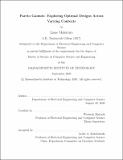Pareto Gamuts : exploring optimal designs across varying contexts
Author(s)
Makatura, Liane.
Download1227278307-MIT.pdf (6.527Mb)
Alternative title
Exploring optimal designs across varying contexts
Other Contributors
Massachusetts Institute of Technology. Department of Electrical Engineering and Computer Science.
Advisor
Wojciech Matusik.
Terms of use
Metadata
Show full item recordAbstract
Manufactured parts are meticulously engineered to perform well with respect to several conflicting metrics, like weight, stress, and cost. The best achievable trade-offs reside on the Pareto front, which can be discovered via performance-driven optimization. Objective functions used to define the Pareto front often incorporate assumptions about the context in which a part will be used, including loading conditions, environmental influences, material properties, or regions that must be preserved to interface with a surrounding assembly. Existing multi-objective optimization tools are only equipped to study one context at a time, so engineers must run independent optimizations for each context of interest. However, engineered parts frequently appear in many contexts: wind turbines must perform well in many wind speeds, and a bracket might be optimized several times with its bolt-holes fixed in different locations on each run. In this paper, we formulate a framework for variable-context multi-objective optimization. We introduce the Pareto gamut, which captures Pareto fronts over a range of contexts. We develop a global-local optimization algorithm to discover the Pareto gamut directly, rather than discovering a single fixed-context "slice" at a time. To validate our method, we adapt existing multi-objective optimization benchmarks to contextual scenarios. We also demonstrate the practical utility of Pareto gamut exploration for several engineering design problems.
Description
Thesis: S.M., Massachusetts Institute of Technology, Department of Electrical Engineering and Computer Science, September, 2020 Cataloged from student-submitted PDF version of thesis. Includes bibliographical references (pages 69-73).
Date issued
2020Department
Massachusetts Institute of Technology. Department of Electrical Engineering and Computer SciencePublisher
Massachusetts Institute of Technology
Keywords
Electrical Engineering and Computer Science.